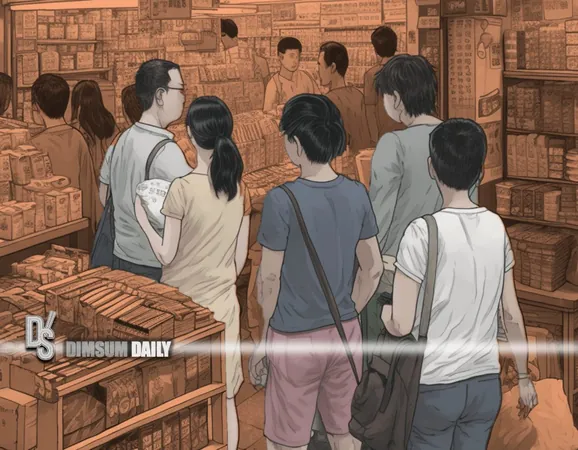
The Surprising Rise of Value Retailers: How Hong Kong is Reinventing Its Economic Landscape
2024-12-26
Author: Wai
The Retail Revolution in Hong Kong
As 2024 draws to a close, Hong Kong finds itself in the midst of a retail revolution that is dramatically reshaping its consumer culture and economic identity. At the forefront of this movement is T.momo Shopping Mall, whose latest opening in North Point attracted swarms of shoppers eager to snag cheap essentials—a far cry from the high-end luxury goods typically associated with the city. Shoppers are now flocking for HK$2 razors and HK$12 bundles of socks, embodying a shift where value has become the new status symbol.
The Emergence of Value Retailing
This transformation isn’t solely a consequence of the pandemic but reflects a deeper restructuring of Hong Kong’s economic landscape. A new trend dubbed the “grassroots retail revolution” is emerging, driven by shifting economic realities and changing consumer spending habits. Surprisingly, establishments offering affordable options—from HK$39 two-dish rice restaurants to HK$70 express haircut shops—are re-defining what consumers now deem acceptable.
Market Dynamics
Consider this: while traditional retail sales plummeted by 11.5% in May 2024, T.momo has expanded to 11 locations in just two years, showcasing a significant shift in the retail paradigm. “Hong Kong’s retail transformation isn’t about poverty—it’s about pragmatism,” explains Dr. Raymond Wong, a retail economist. Consumers now see value-seeking behavior as a badge of honor rather than a sign of desperation.
The Drivers Behind the Change
T.momo’s North Point store opened its doors on Christmas Day, mirroring the excitement typically reserved for luxury brand launches, but the celebration stemmed from customers scoring household essentials at prices lower than those on Taobao, China’s e-commerce giant.
Economic Pressures
So, what’s driving this dramatic change? A convergence of economic pressures on the middle class has prompted this reset. High property prices, remaining daunting despite a 30% correction, paired with a stagnant Hang Seng Index eroding wealth, compel consumers to rethink their spending habits. Once inclined to indulge in premium experiences, Hong Kong residents are now taking pride in their ability to hunt for bargains.
Shifting Consumer Preferences
The HK$70 haircut phenomenon illustrates this shift further, as straightforward barbershops become increasingly popular in areas formerly inhabited by upscale salons. These no-frills establishments, offering ten-minute cuts without frills, have tapped into a new customer base eager for efficiency and cost-effectiveness. Additionally, the two-dish rice revolution has captured a diverse clientele, from everyday workers to finance professionals, meeting a crucial need for swift, affordable dining.
The Competitive Edge of Budget Retailers
T.momo epitomizes the refined evolution of budget retailers by maintaining direct relationships with mainland manufacturers and taking advantage of reduced commercial rents. A HK$2 razor set sold for HK$11 on Taobao showcases their competitive pricing strategy, proving that budget shopping can be both advantageous and trendy.
Changing Perceptions
As Dr. Terence Chong of Chinese University notes, “It’s not just about the low prices; these businesses have made budget shopping legitimate for the middle class and removed the stigma around bargain hunting.” This radical shift in consumer behavior portends significant implications for Hong Kong’s economic DNA.
The Future of Retail
While luxury retail remains a notable component of the market, the rise of value retailers signifies a potentially permanent restructuring in how consumers evaluate worth. Faced with intense competition, traditional retailers must adapt or risk losing relevance as shoppers embrace a mindset that prioritizes value over opulence.
Long-lasting Changes
In fact, this newfound appreciation for budget options will likely endure even if economic conditions stabilize. “You can’t put the bargain genie back in the bottle,” states a retail analyst, emphasizing the long-lasting shift in consumer values.
Potential Economic Benefits
Interestingly, this transformation could ultimately bolster Hong Kong’s economy rather than diminish it. The emergence of sophisticated budget retailers has generated new business opportunities and jobs, promoting a more livable environment for residents. The affordability landscape is creating a parallel economy that balances necessity with choice, moving away from reliance on high-end brands.
Looking Ahead
Looking ahead to 2025, it seems that this trajectory will only continue to accelerate. Commercial landlords are already adjusting their rental expectations, and we may see a surge in mainland manufacturers forging partnerships with Hong Kong’s budget retailers. Other companies will likely be inspired by T.momo’s success, amplifying competition within the value retail space.
Conclusion
Ultimately, the evolution of Hong Kong’s retail sector reflects its capacity for reinvention in response to shifting circumstances. The city’s transition from a manufacturing powerhouse to a financial hub, and now from a luxury shopping haven to a more balanced retail ecosystem, emphasizes inclusivity for all segments of society.
The future landscape of Hong Kong retail won’t be a choice between luxury and budget—rather, it will foster a sustainable marketplace where both can thrive. Success will hinge on the ability to provide genuine value to a progressively discerning consumer base. This transformation may not only solidify Hong Kong's status as a global retail destination but could also redefine it for the better.



 Brasil (PT)
Brasil (PT)
 Canada (EN)
Canada (EN)
 Chile (ES)
Chile (ES)
 España (ES)
España (ES)
 France (FR)
France (FR)
 Hong Kong (EN)
Hong Kong (EN)
 Italia (IT)
Italia (IT)
 日本 (JA)
日本 (JA)
 Magyarország (HU)
Magyarország (HU)
 Norge (NO)
Norge (NO)
 Polska (PL)
Polska (PL)
 Schweiz (DE)
Schweiz (DE)
 Singapore (EN)
Singapore (EN)
 Sverige (SV)
Sverige (SV)
 Suomi (FI)
Suomi (FI)
 Türkiye (TR)
Türkiye (TR)